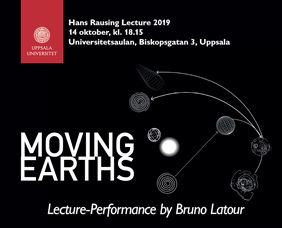Hans Rausing Lecture 2019
Bruno Latour: Moving Earths (A Lecture-Performance)

Abstract
When Galileo directed his telescope to the sky in 1609, he discovered mountains on the surface of the Moon, making it another Earth, and the Earth one of many stars. He thus disrupted the cosmic order, but also the political and social order of his time. Four centuries later, researchers James Lovelock and Lynn Margulis discover a ”moving” Earth, in another sense: they describe a planet where space and time are the products of the actions of the living. They force us to change our world view and our understanding of the cosmos. And, once again, the whole organization of society seems to be in question.
We invite spectators to test the hypothesis of a parallel between the time of the astronomical revolution and ours. Are we experiencing a transformation of the world as profound and radical as that of Galileo’s time? One thing is certain: we no longer know exactly what planet we live on or how to describe it. It is not a single Earth, fixed and stable, but a multitude of planets that appear before us, and that we must explore to know on which to land. Moving Earths stages the spectacle of thought in the making. The audience watches a philosopher who thinks with his hands, on the set, like a craftsman at work. On his desk: books, documents, an Ipad, photographs, a notebook, machines, optical instruments, chalk – objects that he grabs and by which he builds his reflection.
About the Lecturer
Bruno Latour is a sociologist, anthropologist and philosopher of science. His work earned him the highest distinction in social sciences in 2013, the Holberg Prize. Professor at Science Po, Paris, he was interested in the sociology of science and the processes of scientific research (La Vie de laboratoire), the dynamics of innovations and the philosophy of the techniques that result from them (Aramis or the Love of Techniques), or philosophical anthropology (We have never been modern), questioning the distinction between nature and society, and political ecology (Politics of Nature. How to bring science into democracy). He is also the curator of several exhibitions: Iconoclash, Making Things Public and Reset Modernity!
He taught for a long time in engineering schools, first at the CNAM, then at the École des Mines where he joined the Centre de sociologie de l’innovation in 1982. Since September 2006, he has been a professor at Sciences Po, where he heads the Médialab and creates the SPEAP program.
